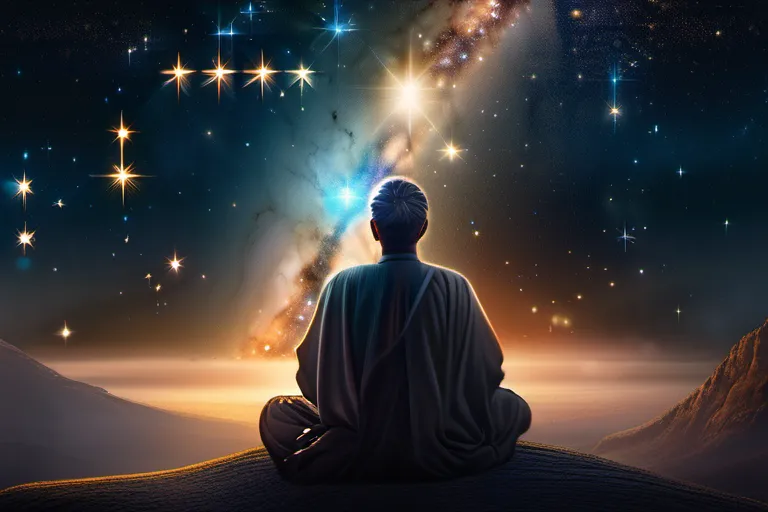Explore the history, beliefs, and impact of deism on society.
Deism is a philosophical belief that proposes the existence of a supreme being who created the universe but does not interfere with its operations. In this article, we delve into the intricacies of deism, tracing its origins, key figures, and the impact it has had on society.
The Origins of Deism
The origins of deism are shrouded in the intellectual climate of the Renaissance and the Enlightenment. How did this movement, which challenged traditional religious beliefs, come to be? Let’s dive into the historical context that shaped deism.
When did deism begin? It is often traced back to the 17th century, a time when the world was awakening from the dark ages. Think of it as dawn breaking after a long night—deism emerged as a beacon of reason and rationality in a world still grappling with superstition and dogma.
John Locke, one of deism’s most prominent early advocates, argued that knowledge of God could be derived through human reason alone. This was akin to saying we didn’t need the church as an intermediary; our minds were capable of understanding spiritual truths directly from nature itself. How revolutionary was this idea in a time when the Church had absolute power over people’s beliefs and lives?
The Age of Reason, driven by thinkers like Percy Bysshe Shelley and Ralph Waldo Emerson, further propelled deism. These figures saw nature not just as a place to explore but as a living, breathing testament to the existence of God. Wasn’t it just like looking at the vastness of the universe and feeling small yet connected? The stars themselves seemed to whisper about some grand design, pointing towards a creator who didn’t need religious institutions to be worshipped.
Deists believed in an all-powerful but non-intervening God, much like a parent who sets up rules for their children’s safety and then trusts them. Isn’t it interesting how this metaphor applies to our lives, as well? We make choices guided by reason and morality, just as deism suggests we should understand the world without needing divine intervention in every aspect.
So, as you reflect on these early figures and their ideas, consider: did they pave the way for a more rational and less dogmatic approach to religion?
Deistic Beliefs: A Closer Look
When we think about deism, it’s like peering into a window that offers a unique view on the nature of God and the universe. Deists believe in a rational understanding of faith, where God is seen as a clockmaker who set everything in motion but doesn’t intervene. This belief system emerged during a time when people were questioning traditional religious practices and seeking clearer, more logical explanations for existence.
One of the core deistic beliefs is that reason should be the primary guide to understanding the world. It’s as if we’re using a magnifying glass to examine nature closely, believing it reveals clues about the grand design. This approach contrasts sharply with the idea of miracles or divine intervention in daily life, suggesting instead that natural laws govern everything.
Deism challenges us to think deeply: If God created the universe and set its laws, why would He need to constantly interfere? And if nature follows a predictable pattern, doesn’t that suggest a rational creator who designed it this way? These questions lead us down a path of inquiry where we seek to understand through observation rather than revelation.
Another key aspect is the separation of church and state. Deists argue for a secular society where personal beliefs are respected but not imposed on others. This can be likened to a garden where each plant grows according to its nature, free from external forces that might distort its natural growth. In such a society, individuals are encouraged to find their own path in faith, rather than being dictated to by religious authorities.
Understanding deism means embracing the idea of an all-powerful yet distant God who created the world and allowed it to operate on its own. This belief system has had profound impacts on philosophy and science, leading thinkers to explore the natural world with a sense of awe and curiosity, driven by the understanding that there are laws inherent in nature waiting to be discovered.
The Influence of Deism on Philosophy and Science
The Enlightenment period was a time when old certainties were being questioned and new ideas were flourishing. Deism, which emerged during this era, had a profound impact on both philosophy and science. How did deistic principles shape these fields? Let’s explore.
Imagine the Enlightenment as a garden where philosophers and scientists planted seeds of knowledge and reason. Deism provided one of the most fertile soils for their growth. With its belief in a watchmaker God, who set the universe in motion but does not intervene, deism offered a rational approach to understanding the world around us.
Deists like Thomas Paine and Jean-Jacques Rousseau argued that through reason and observation, one could discover truths about nature. This aligns perfectly with the scientific method, which was gaining momentum during this time. How did these ideas influence the development of modern science? Consider how deism’s emphasis on empirical evidence encouraged scientists to look for patterns in nature without resorting to supernatural explanations.
The impact of deism on philosophy is equally significant. Philosophers began to question traditional religious doctrines and sought to establish moral principles based on rationality rather than faith. This shift towards secular ethics had far-reaching consequences, shaping the way we think about human rights and governance today.
But how did this play out in practice? Think of the Age of Reason as a series of intellectual battles where deistic ideas were pitted against more orthodox religious views. These debates not only advanced scientific progress but also helped foster a culture that valued individual freedom and critical thinking.
In summary, deism’s influence on philosophy and science during the Enlightenment was pivotal. By blending rational thought with an understanding of nature, deism laid the groundwork for many of the advancements we take for granted today. As we continue to navigate complex issues in our modern world, the legacy of deism serves as a reminder of the power of reason and empirical evidence in shaping human knowledge and values.
Deism in Modern Times: A Resurgence?
Have you ever pondered why some people prefer to believe without a structured religion? Deism, often seen as a bridge between traditional religious beliefs and secular thought, has gained new relevance in modern times. In fact, its resurgence might just be hinting at a broader shift towards more personal spiritual approaches.
Deism, with its emphasis on reason and nature rather than revelation, seems to resonate with the contemporary quest for individualized faith. Consider the metaphor of a river: like water flows naturally, deism suggests that people gravitate towards beliefs based on their own experiences and rational thought. This flexibility makes it appealing in an era where traditional religious institutions are facing challenges.
But why is deism making a comeback? Could it be that societies are seeking a balance between the rigid dogmas of organized religion and the agnostic stance of atheism? The answer might lie in the adaptability of deism, which allows individuals to find their own path. Think about it: just as a tree grows differently based on its environment, people’s beliefs can evolve based on their unique life experiences.
Moreover, the digital age has made information more accessible than ever before. People are no longer confined to traditional religious teachings; they can explore and form their beliefs through online resources. This democratization of knowledge could be fueling a deistic revival, as individuals seek meaning beyond organized religion.
The question remains: Can deism truly offer the personal fulfillment that people crave? Its core belief in a divine creator who does not interfere with the universe invites introspection and self-discovery. Could this form of spirituality lead to a more meaningful connection between individual and cosmos, much like how a garden thrives when nurtured by its caretaker?
The Role of Deism in Shaping Society
Imagine history as a vast river, where each major belief system contributes to its flow. Deism, often seen as a bridge between ancient philosophy and modern secular thought, has played a significant role in shaping societal norms, values, and institutions throughout time.
How did deism influence society? Think of it like the quiet, steady current that subtly guides the larger stream of civilization. In Europe during the Enlightenment, deists challenged the established religious orthodoxy by emphasizing reason over revelation. This shift not only paved the way for scientific advancements but also fostered a more secular approach to governance and education.
Consider how deism’s emphasis on natural law and personal faith without institutional ties might have contributed to the American Revolution. The Founding Fathers, many of whom were influenced by deistic ideas, drafted documents that emphasized individual rights over religious mandates. Documents like the Declaration of Independence and the Constitution reflect this blending of Enlightenment values with a more secular approach.
Deism also had an impact on literature and philosophy. Think of writers like Voltaire and Thomas Paine who championed deist principles in their works, advocating for reason and tolerance. Their writings not only entertained but also educated readers about the merits of a belief system that valued individual inquiry over dogmatic beliefs.
Moreover, deism’s influence can be seen in the rise of humanism during the Renaissance and beyond. This movement emphasized the potential goodness of humanity, aligning closely with deist views on human reason and morality. By highlighting the capacity for good within individuals, deism contributed to a broader cultural shift towards individual autonomy.
As we reflect on the role deism has played in shaping society, it’s clear that its emphasis on reason and personal belief over institutional control has had far-reaching effects. From political philosophy to scientific inquiry, deism continues to resonate, offering a unique perspective that bridges the gap between faith and reason.
Deism vs. Other Belief Systems: A Comparative Analysis
Understanding deism as a belief system can be like stepping into a vast, open field where traditional religious structures have been stripped away to reveal a simpler, more philosophical landscape. But how does this perspective compare to other belief systems? Let’s explore deism in light of its contrasts with monotheism and atheism.
When we delve into monotheism, the belief in one all-powerful, all-knowing God, it’s like standing before a grand temple. Deists also see this temple but perceive it differently. For deists, the concept of God is not about command and control, but more about understanding and wisdom—akin to a wise sage who created the universe with a set of laws that operate naturally without intervention.
In contrast, atheism, often seen as the absence of belief in any gods, presents itself like an empty stage. Deists believe in a deity but see divine intervention in the natural order rather than specific miracles or supernatural events. This perspective is like having a script for a play, where the actors follow their lines naturally and without prompting.
Moreover, deism aligns with humanism, focusing on human reason, ethics, and the potential for self-improvement. It’s as if deists are viewing humanity through a pair of glasses that emphasize our ability to understand and shape the world around us. While humanism emphasizes human achievements and morality, deism supports these ideals by grounding them in the rationality and self-evident truths about the universe.
Each belief system offers a unique lens through which we can view the world. Deism provides a philosophical approach that seeks to harmonize reason with faith, allowing for a more open-ended exploration of existence. By understanding deism’s distinctive characteristics, we gain insights into how it complements and contrasts with other belief systems, enriching our comprehension of diverse religious and philosophical landscapes.
Conclusion
 By understanding deism, we gain a deeper appreciation for the evolution of religious thought and its role in shaping our worldview. This article serves as an essential resource for anyone seeking to explore this fascinating topic.
By understanding deism, we gain a deeper appreciation for the evolution of religious thought and its role in shaping our worldview. This article serves as an essential resource for anyone seeking to explore this fascinating topic.











